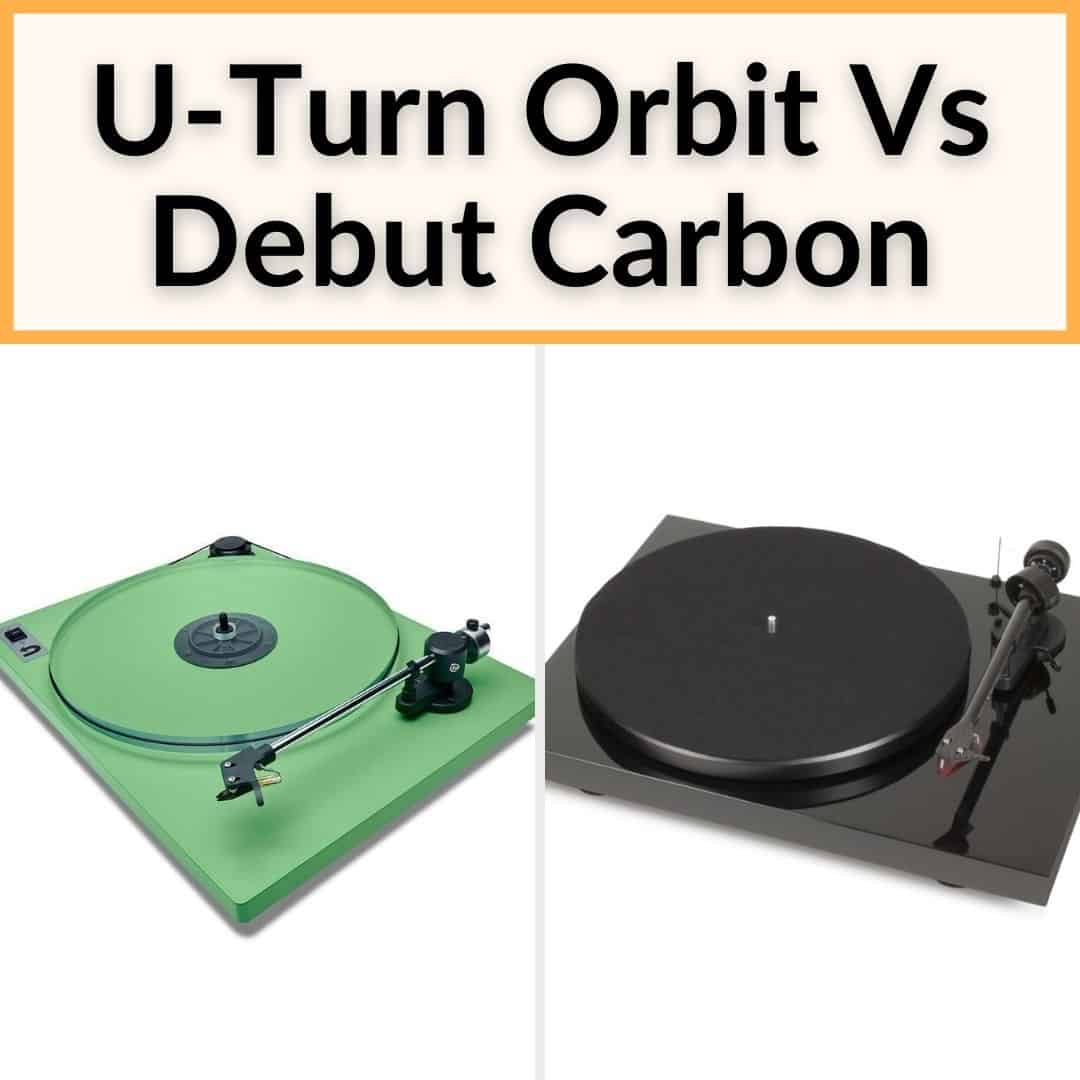
I’m not a fan of modern minimalist turntables.
Don’t get me wrong, they can be great.
But they’re not for me.
I just wanted to mention that, so you know from the start how I feel about the two record players we’re discussing here.
But I will be objective and have no problem saying both are amazing turntables, even though I would personally never buy either one.
Read the rest of this U-Turn Orbit Vs Debut Carbon comparison to find out why they’re not for me, along with everything else you need to know about these two turntables.
Contents
- 1 U-Turn Orbit Vs Debut Carbon
- 1.1 What Is The U-Turn Orbit?
- 1.2 What Is The Pro-Ject Debut Carbon?
- 1.3 Differences Between U-Turn Orbit And Pro-Ject Debut Carbon
- 1.4 Similarities
- 1.5 Advantages Of The U-Turn Orbit
- 1.6 Advantages Of The Pro-Ject Debut Carbon
- 1.7 Reasons To Get The U-Turn Orbit
- 1.8 Reasons To Get The Pro-Ject Debut Carbon
- 2 Pro-ject Debut Carbon Vs U-Turn Orbit: Final Thoughts
U-Turn Orbit Vs Debut Carbon
We’ll begin by looking at each record player individually, before comparing and contrasting them. We’ll finish with the main reasons to get each of these turntables over the other.
What Is The U-Turn Orbit?
- Great sound and performance
- Unique and stunning design
- Excellent stylus (Ortofon OM5E)
- As minimalistic as possible
- 5 color choices
- No speed switch (you have to move the belt manually)
The U-Turn Orbit is a minimalist hipster turntable. It sounds great and looks European.
The things that stand out, if you are not familiar with this model, are the clear acrylic platter and the lack of speed buttons. More things appear to be missing on this turntable as well.
There is no light, no pitch control, and no built-in preamp. While this is annoying to me, to some people this is exactly what they want.
Less can be more, they say. I agree in many cases, but in the case of the U-Turn Orbit, I would have appreciated at least a speed switch.
To change the speeds, you need to move the belt to the second rung of the motor. This is silly and reminds me of purposely avoiding something that would make operation better, just to be extra minimalist. As I said, this is for hipsters.
What Is The Pro-Ject Debut Carbon?
- Lightweight yet very sturdy and stable
- Extremely high-quality components for exceptional sound
- Very low price given the quality
- Available in multiple colors
- Consistent speed and reduces almost all vibrations and unwanted resonances
- Comes with 2-year manufacturer’s warranty
- No Bluetooth connectivity
- No USB port
- No headphone jack
This is another minimalist audiophile style turntable marketed to hipsters. It sounds really good, though, so I won’t hold it against them that they are following the unnecessarily minimalist trend here.
In truth the Pro-Ject Debut is not following the trend. It was one of the first to set this trend back in the early 90s, when these kind of minimalist hipster turntables were just reaching their potential.
It is a 2-speed turntable with basically the same features (or lack of features) as the U-Turn. No speed switch, no light, no built-in preamp. It has a belt drive motor, and full European minimalist esthetic.
It comes with a better cartridge though. Pro-ject includes the Ortofon 2M Red, which is surprising to see as a stock cartridge on any turntable.
Differences Between U-Turn Orbit And Pro-Ject Debut Carbon
Most of the differences here are esthetic, though there are some functional or technical differences between the two as well. We’ll begin with the esthetic differences and then move on to the rest.
Finish
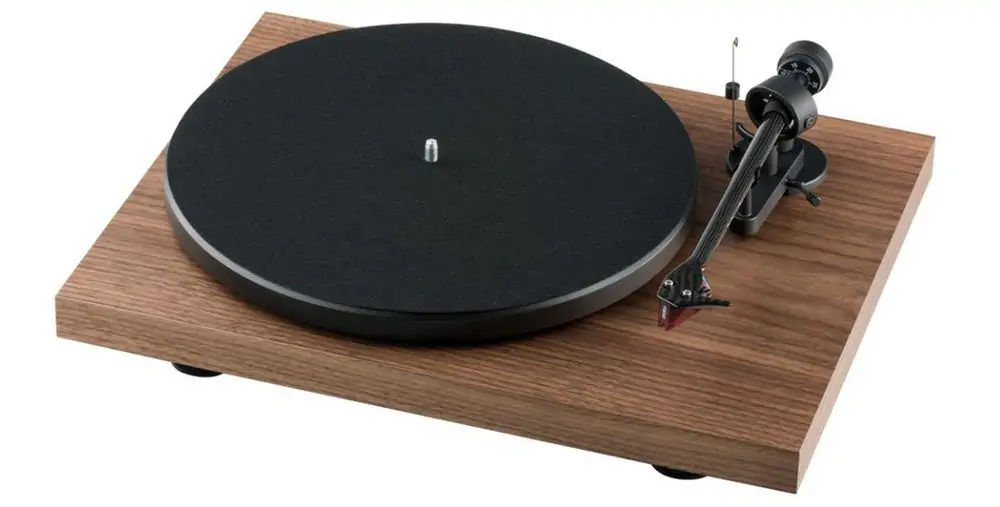
The Pro-Ject Debut Carbon has a wood finish (fake wood don’t get excited) or your choice of a bunch of different colors, while the U-Turn is gloss white (or red, or black, or blue, or green).
Power Switch
On the Orbit, it is right on the top front where you can easily press it. On the Pro-Ject DC, it is underneath.
Yes, it is underneath because why would you want to be able to easily turn it off or on? To be fair it is easy to hit with your finger, but it just annoys me that they chose to design it this way.
Price
The Pro-Ject Debut Carbon is going to set you back about a hundred bucks more, so that is a big difference here between the two units. I chalk up the extra hundred bucks to the Ortofon red cartridge. I can’t see any other reason this unit would be more expensive other than the better cart.
Changing Speeds
While they are both annoying, the Debut wins the more annoying award for changing speeds. Instead of just pressing a button (how barbaric!) you have to lift the platter (not kidding) and access where the belt attaches to the motor and move it to the next tier of the pulley.
Just when you thought the U-Turn was unnecessarily difficult, the Debut comes and makes it even harder for no reason.
Tonearm
The Pro-Ject DC has a carbon tonearm to make it more lightweight and less conductive for vibrations. The U-Turn has a metallic tonearm.
Similarities
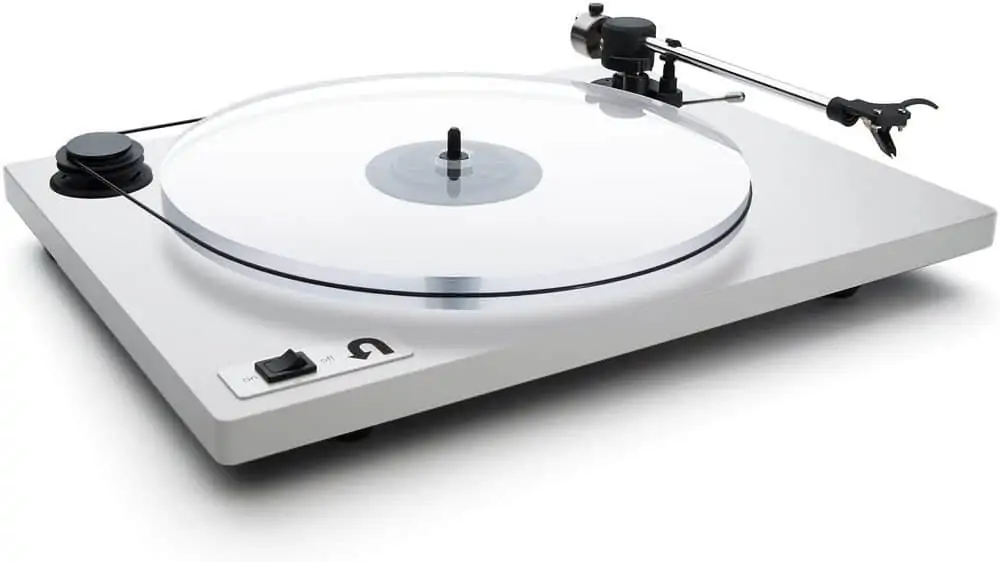
Now let’s take a look at the similarities between these two modern record players. As you might expect, there are quite a few.
Esthetics
They both have the same esthetic: minimalist at the expense of convenience. There is nothing to see when you look at it but a tonearm, a platter, and a slab of plastic or fake wood. No lights, no-frills, no buttons.
Functionality
They are both 2-speed turntables. Neither has an option for 78 speeds. This surprises me because the new generation of beanie-wearing hipsters loves to listen to old shellac swing records. I guess they need to buy a normal turntable for those.
Connections
They both have the RCA connections underneath on the back, along with the DC power adapter port. They could have easily been designed by the same person. They are nearly identical in the way they were laid out.
Good Stock Carts
They both come with above-average stock cartridges, though the Debut comes with an Ortofon Red, which is a tier above the Ortofon OM5E.
Excellent Sound
They are both great sounding units, way above average and great values for the price. They are not in the over $500 tier of turntables, but in this range, you would have to try hard to get a better-sounding unit.
Isolated Motors
They both have the motor isolated away from the rest of the unit. This avoids the motor noise transferring to the rest of the turntable.
It is good idea that results in a very low-noise listening experience. No need to troubleshoot noise with this record player.
Advantages Of The U-Turn Orbit
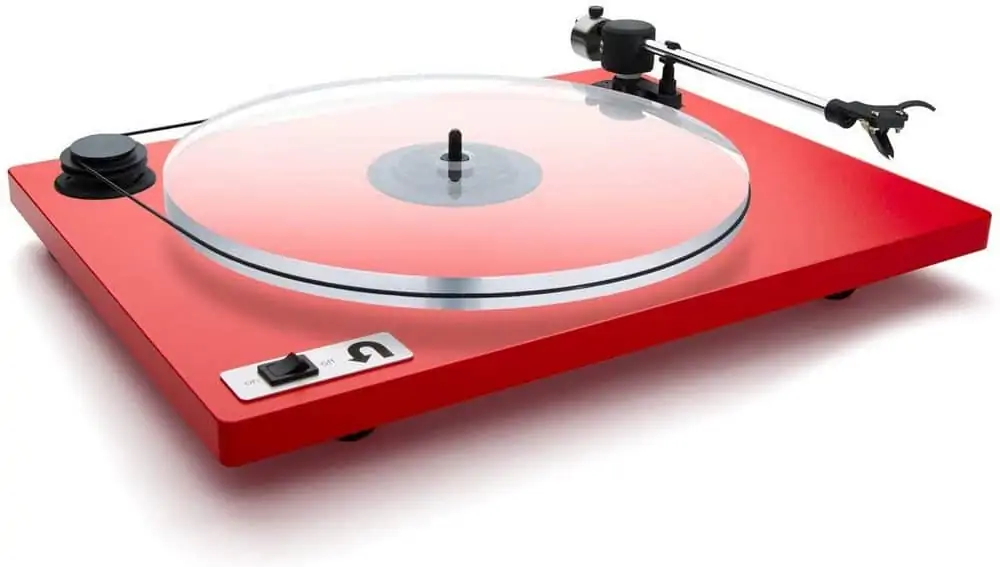
The biggest advantage is that it is significantly cheaper. As I said earlier, I chalk this up the stock Ortofon red that the Pro-Ject comes with.
It is a better cart than the one you get with the U-Turn. The Ortofon Red 2m is an excellent cart, but so is the OM5E. It is only around 30 bucks less than the red. Both are excellent cartridges, especially to come stock.
The other big advantage is that it is less annoying. The U-Turn makes it easier to change speeds and turn the thing on or off with a switch you can see and get to. The Pro-Ject Debut goes out of its way to piss you off.
Advantages Of The Pro-Ject Debut Carbon
The Pro-Ject Debut Carbon has a longer lineage, which should count for something. It has a more classy look overall, especially the version with the manufactured wood grain appearance.
Getting the Ortofon red is an obvious bonus to buying this one. It will sound slightly better initially than the U-Turn (though this is not a fact, some people prefer the OM5E cartridge to the red).
It has a fancier motor suspension as well, but the U-Turn has its motor separated so this is a minor point.
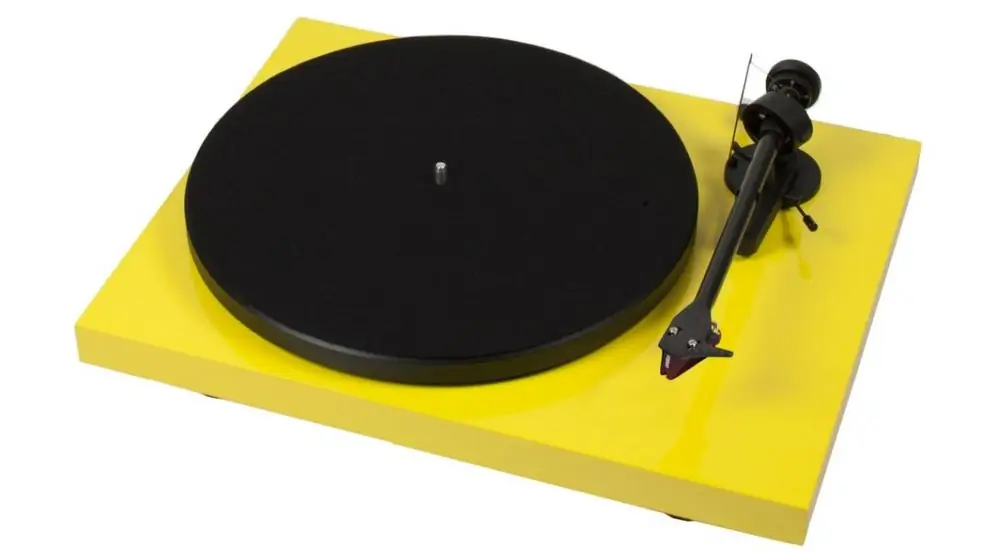
Reasons To Get The U-Turn Orbit
If you like the look of the U-Turn and you want to be the only kid on your block to have a red or green turntable, the Orbit is for you.
It sounds fantastic and has all the hipster charm you are looking for. It will also cost a bit less than the Pro-Ject Debut. If I had to choose between these two, I would get the U-Turn for sure.
Reasons To Get The Pro-Ject Debut Carbon
If you like the wood grain look and have your heart set on getting an Ortofon red to come stock, this turntable is for you. Plus, you have tons of other color choices and all look great.
If you don’t mind lifting the platter and monkeying with the belt whenever you want to slap on a 7” single, or digging around underneath it to turn it off, this is a great choice for you.
It sounds fantastic. Seriously. I just wish they would chill out on the Portlandia a bit.
Pro-ject Debut Carbon Vs U-Turn Orbit: Final Thoughts
When comparing the U-Turn Orbit vs Pro-ject Debut Carbon, one thing is clear right off the bat. These two turntables are very similar.
Both are modern and minimalist. Both play the same record speeds and both lack any buttons, knobs or switches. That lack of controls goes along with a lack of features.
Unfortunately, some of the features that are lacking, most notably the ability to easily switch playing speeds, are ones I sorely miss.
This “minimalism over function” philosophy just rubs me the wrong way and is the reason neither of these record players is the one for me.
But if you want your turntable to be as minimalist as possible, these two models are probably the best values on the market today. Both are excellent. And the two brands are both great turntable manufacturers with a stellar reputation.

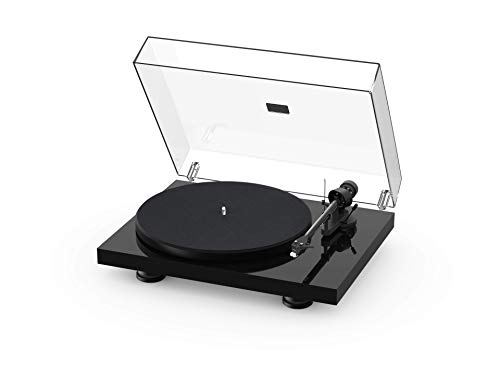
Self righteous, pompous, D*ck head of the year award goes to….
What TT have you designed?
I’m sorry for not having the exact same views and opinions as you. How dare I….
While I wouldn’t have used the same language that Kevin does, I share the sentiment. What do you, as the author of this piece, even know about the Pro-Ject? Do you have any idea of the concept and the execution of the product? Hipsters? I don’t know a single one, but I know dozens of people who own Pro=Ject turntables and love them.
It’s nothing to do with wether we agree or not. They made extremely practical engineering choices to reduce wow and flutter/keep costs down. I guess that annoys you so much you had to spew your drivel about it online. What any of that has to do with being minimal or “hipster” is beyond me… it’s done purely for function, and you seem to be missing the mark completely, all while doing so in the most sanctimonious way possible.
Good article, hipster city people with no clue are a the worst part of society. Portland is filled with those trendy followers. That being said I really like the look of these turntables. They are very uncluttered and I feel they go well with a retro shag carpet or modern sleek listening room. I could do without all of the BS like changing speeds by lifting the platter etc, that is like drinking crappy beer but thinking you are cool because it is “craft”. Hipsters lol.
Hipsters are the worst part of society, eh? Worse than white supremacists? Worse than Q-Anon idiots? Worse than Trump worshipping MAGA cultists?
Being basic makes you part of the biggest tribe of all.
I will stick with my 40-year-old Technics SLQ,300 direct drive automatic turntable. Just press a button.
Do you actually own a 45?
I own about a hundred 45s. I used to own a Technics changer. Don’t buy a belt drive turntable. It will play at the wrong speed before the belt needs to be replaced. Only buy direct drive turntable. Automatic turntables are the best for me. Just press a button.
Let me introduce you to the Hanpin made DD like Audio Technica. 1 percent fast out of the box.
Ok,
Let’s get on to the nitty gritty..
Turn tables make no sound. At least they shouldn’t.
It’s the cartridge and stylus!
As to these two tables, nothing is mentioned about tracking capabilities. Can they track at 1 and 1/2 grams? Or chisel the LP?
More refinements?
Covers? Vtl, azimuth?
Sound excellent? ??
What the rest of your system?
I am not sure the point of this review because 99 perecent of this site is nothing but cheap Chinese crap. The two tables mentioned above share the same qualities as my 2 grand SOTA and a huge slice of the high end market . Extra parts means extra noise for your cartridge to pick up.
Don’t know when the original article was written but, the current version of the Debut Carbon Pro comes equiped for 3 speeds. Not 3 speeds at the flip of a switch but it is capable of playing 33/45 with one belt, the flat one, or 78 with a second belt, the round one. The on/off speed switch on the, underside, front left corner of the turntable allows you to choose between 33⅓ or 45.
I agree that looks are subjective, but it’s not a senseless decision solely made to appease ‘hypsters’. You need a solid plinth to absorb as much vibration as possible, not a hollow one full of moving parts and electrincs that emit noise.
I also agree that a switch for speed control is a must, but your other complaints made my sides hurt. What do you need a light and a pitch slider for? Are you a DJ? Those are features that add to the cost and no one who simply listens to music would use. Even worse, DJ TTs come equipped with DJ cartridges, not suitable for casual listening.
Easy does it. Life long music lover here, and have the benefit of being born in the 40s, so maybe a little tolerance for the written word.
The appeal to me buying the Orbit custom was the possibility of upgrading in the future, and liked the ala cart initial purchase. Experimenting with different cartridges is part of the process to find your sound. The out of the box price has let me do that with the Orbit custom, easing the pension burden. Just installed a Grado 3Black and enjoying a tad different sound out of my Maggies.
Don’t necessarily agree with everything written, but thanks for the read.
I have owned a U Turn Orbit for about 4 years- with a maple plinth. The reviewer must not have looked to hard…the TT sounds very good with the Grado upgrade I ordered it with. What I hate about it is- it is such a pain in the arse to change speeds, the skinny round belt keeps rolling off. I have about 125, 45rpm, 12″ singles, Japanese presses, that I like playing from time to time. I would not buy another one because of the belt issue
I love my Technics SL-Q300 quartz locked direct drive automatic turntable. just press a button and listen to music.
No belts to replace.
To each their own, and all that. I’m looking at a Pro-Ject Debut Carbon EVO, and comparing to similar competitors like U-Turn Audio. I feel like the “hipster” claim is a bit over-the-top.
I wouldn’t classify myself as a hipster at all. I’m interested in vinyl because I was born long enough ago that an early portion of my life was spent with a family stereo that had a record player, we still have some of those albums, and new ones are being made. I hope some of them aren’t mastered with 3dB of dynamic range. I also just want to reconnect with the ritual of playing music intentionally. The very manual process of loading a disc on a record player, flipping it over halfway through, and removing the stylus at the end … that appeals to me in a meditative kind of way. It takes more effort than queueing up a stream of digital audio. I don’t feel the need to advertise this to anyone else. I’m not doing it for “cred.” I just love music, and this seems like a way to enjoy it with more of my senses. And, sometimes distortion is good. Perfect is wonderful, but flawed can be enjoyable, too — particularly when it’s an *option.*
About the excessive minimalism — I agree, some creature comforts are nice. The latter Carbon models have a speed switch, which is a welcome change — although, I have no 45s, and no plans to purchase any, so I don’t know if it would ever leave the 33-1/3 setting anyway. An integrated phono pre would be nice, too. Particularly if it could be physically bypassed if I wanted to use something more exotic. But it’s not a big deal. I do have some equipment with a phono pre, and a standalone preamp can be bought / built for not that much money.
Mostly, I just really… REALLY… appreciate that there isn’t a lot of feature bloat here. I’ve always been a “do a thing, and do it well” type. I like HiFi separates vs. an integrated mini system. I like the idea of being able to choose each component for its strengths, rather than settling for the best compromise. These turntables are a breath of fresh air compared to the cheap future landfill products with unnecessary miniature computers inside them. They’re serviceable, upgradeable, performance-optimized, don’t have stuff I will never use, and most of all, built to a standard of quality rather than minimum cost. That is a trait that is getting precious hard to find these days, so the tradeoff of having to source my own phono pre, and maybe for some cases, an external line-to-BT transmitter… totally, totally OK. Absolutely worth it. No question.
Horses for courses, brother.